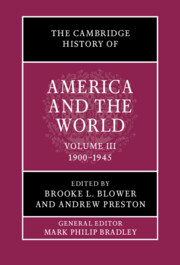Book contents
- The Cambridge History of America and the World
- The Cambridge History of America and the World
- The Cambridge History of America and the World
- Copyright page
- Contents
- Figures
- Maps
- Contributors to Volume III
- General Introduction: What is America and the World?
- Introduction to Volume III
- Part I American Power in the Modern Era
- Part II Competing Perspectives
- 12 Fighting Jim Crow in a World of Empire
- 13 Wilsonianism and Its Critics
- 14 Humanitarianism and US Foreign Assistance
- 15 Women’s Politics in International Context
- 16 The October Revolution and the American Left
- 17 Sexuality and Sexual Politics
- 18 Religious World Views
- 19 Indigenous Sovereignties and Social Movements
- 20 Fascism and Nativism
- Part III The Perils of Interdependence
- Index
13 - Wilsonianism and Its Critics
from Part II - Competing Perspectives
Published online by Cambridge University Press: 12 November 2021
- The Cambridge History of America and the World
- The Cambridge History of America and the World
- The Cambridge History of America and the World
- Copyright page
- Contents
- Figures
- Maps
- Contributors to Volume III
- General Introduction: What is America and the World?
- Introduction to Volume III
- Part I American Power in the Modern Era
- Part II Competing Perspectives
- 12 Fighting Jim Crow in a World of Empire
- 13 Wilsonianism and Its Critics
- 14 Humanitarianism and US Foreign Assistance
- 15 Women’s Politics in International Context
- 16 The October Revolution and the American Left
- 17 Sexuality and Sexual Politics
- 18 Religious World Views
- 19 Indigenous Sovereignties and Social Movements
- 20 Fascism and Nativism
- Part III The Perils of Interdependence
- Index
Summary
In the history of US foreign policy, World War I and its aftermath represents the hinge between the period when the nation played only a marginal role in great-power politics and that in which it has done more than any other to shape them. There were two aspects to this transition. One was the projection of substantial power beyond the Western Hemisphere for the first time. In 1917, the United States embarked on a joint war effort with the Allied powers against Imperial Germany and thereby determined the outcome of World War I. The second aspect was the development of an agenda for the shaping of overseas developments and of the nature of international order generally. This began in 1916 when President Woodrow Wilson made an undertaking to participate on a long-term basis in a postwar collective security organization that was envisaged as the capstone of a liberal international order as well as the guarantor of world peace. Commitment to establishing and maintaining such an international order came in later years to be known as “Wilsonianism,” a term originally coined by its critics but later adopted by its adherents also. In the short term, neither of these developments was sustained. After victory, US forces were withdrawn from Europe and the huge, largely conscripted, army was drastically reduced (if not to prewar size). Then the Treaty of Versailles failed to win Senate approval, leaving the United States outside the League of Nations that Wilson had done so much to establish. Since the 1940s, however, with the renewed projection of American power, now on a longer-term basis, Wilson’s vision has enjoyed renewed influence, though it has never been without its critics.
- Type
- Chapter
- Information
- The Cambridge History of America and the World , pp. 315 - 336Publisher: Cambridge University PressPrint publication year: 2022

